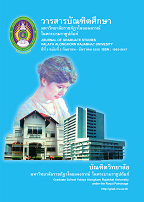สมรรถนะภาวะผู้นำเชิงนวัตกรรมเพื่อการบริหารการผลิตอาหารโอทอปในภาคตะวันออกเฉียงเหนือของประเทศไทย
Main Article Content
บทคัดย่อ
การศึกษานี้มีวัตถุประสงค์เพื่อ (1) ศึกษาภาวะผู้นำเชิงนวัตกรรมเพื่อการบริหารการผลิตอาหารโอทอปในภาคตะวันออกเฉียงเหนือ (2) ศึกษาหลักธรรม ไตรสิกขา และตัวแบบ KSM ที่นำมาบูรณาการกับการพัฒนาสมรรถนะภาวะผู้นำเชิงนวัตกรรมเพื่อการบริหาร และ (3) นำเสนอแนวทางการพัฒนาสมรรถนะภาวะผู้นำเชิงนวัตกรรม การวิจัยเชิงปริมาณใช้กลุ่มตัวอย่างจาก ผู้ประกอบการและผู้บริโภค จำนวน 400 คน สุ่มแบบหลายขั้นตอนและใช้แบบสอบถามและการวิจัยเชิงคุณภาพ ได้แก่ ผู้ประกอบการที่ได้รับการรับรองคุณภาพระดับ 5 ดาว จำนวน 18 คน และแบบสัมภาษณ์ สถิติที่ใช้ในการวิจัย ได้แก่ ค่าเฉลี่ย ค่าส่วนเบี่ยงเบนมาตรฐาน การอุปมานวิเคราะห์ และตีความ
ผลการวิจัย พบว่า (1) ภาวะผู้นำเชิงนวัตกรรม โดยภาพรวมและรายด้านอยู่ในระดับสูง ได้แก่ การจำหน่าย กลยุทธ์ทางการตลาด วัตถุดิบ การจัดตั้งกลุ่มออมทรัพย์ การฝึกอบรมเพื่อการผลิตที่มีคุณภาพ (2) หลักธรรม ไตรสิกขา และตัวแบบ KSM สามารถนำมาบูรณาการกับการพัฒนาสมรรถนะภาวะผู้นำเชิงนวัตกรรมได้พบว่า ด้านหลักธรรมคือการปฏิบัติตนตามศีล การให้ทาน ด้านการบริหารอยู่ในระดับสูง โดยที่หลักคุณธรรมและจริยธรรมอยู่ในระดับสูง ด้านไตรสิกขา คือ ศีล สมาธิและปัญญา อยู่ในระดับสูงและหลักปรัชญาเศรษฐกิจพอเพียงอยู่ในระดับสูง และการบูรณาการศีลกับความรู้ สมาธิกับทักษะ และปัญญากับการจัดการ หรือ KSM Model อยู่ในระดับสูง (3) แนวทางการพัฒนาสมรรถนะภาวะผู้นำเชิงนวัตกรรม คือ ภาครัฐท้องถิ่นและผู้ประกอบร่วมกำหนดนโยบายให้เป็นโอทอปชุมชน พัฒนาด้านวัตถุดิบ บรรจุภัณฑ์ให้มีมาตรฐาน และส่งเสริมอาหารพื้นเมืองพาแลงให้เป็นที่ยอมรับได้มาตรฐาน เพื่อเตรียมพร้อมในการเข้าสู่ประชาคมเศรษฐกิจอาเซียน
The objectives of research were 1) to study the innovative leadership of the OTOP foods production management in the Northeastern, 2) to study the integration of the threefold training (Tri Shikkha) to develop the innovative leadership competencies and 3) to propose the guidelines for development of innovative leadership competencies towards international standard. The quantitative research consisted 400 respondents comprising the entrepreneurs and consumers of OTOP foods, selected by multistage sampling with a tool of questionnaire. The qualitative research was conducted by in-depth interviews with 18 key informants selected by purposive sampling from the entrepreneurs. Data were analyzed by using mean standard deviation analytic induction and interpretation.
The research findings were as follows: 1) The aspects of innovative leadership found at a high level included ability in distribution, marketing strategies, raw materials installed saving group, and training for quality of production, 2) The integration of the threefold training (Tri Shikkha) with KSM Model able to develop the innovative leadership competencies were found in the aspect of observing the of Precept and donation. The principles of management, integrated with the principles of morality, the principle of Tri Shikkha and with KSM Model and principles of Sufficiency Economy philosophy were at a high level: The integration of precepts with knowledge, concentration skill, were as follows wisdom with management were at high level. 3) The guidelines for development innovative leadership were public sectors and community must collaborate strategies, policy, promoted the symbol of Isan foods, standardize community products, developer to certify and enhanced high opportunities to entering AEC.
Article Details

อนุญาตภายใต้เงื่อนไข Creative Commons Attribution-NonCommercial-NoDerivatives 4.0 International License.
บทความทุกเรื่องได้รับการตรวจความถูกต้องทางวิชาการโดยผู้ทรงคุณวุฒิ ทรรศนะและข้อคิดเห็นในบทความ Journal of Global of Perspectives in Humanities and Social Sciences (J-GPHSS) มิใช่เป็นทรรศนะและความคิดของผู้จัดทำจึงมิใช่ความรับผิดชอบของบัณฑิตวิทยาลัย มหาวิทยาลัยราชภัฏวไลยอลงกรณ์ ในพระบรมราชูปถัมภ์ กองบรรณาธิการไม่สงวนสิทธิ์การคัดลอก แต่ให้อ้างอิงแหล่งที่มา


